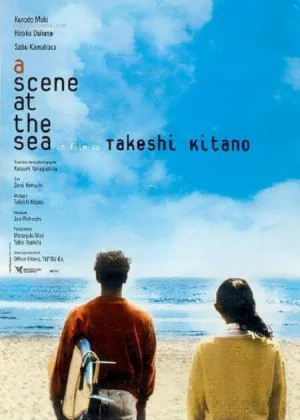A Scene at the Sea
Takeshi Kitano is the director who introduced me to Japanese live action cinema, so he'll forever hold a special place in my heart. A Scene at the Sea [Ano Natsu, Ichiban Shizukana Umi] is one of his earliest films, made back when he was still establishing his signature style. That's no doubt the primary reason why I waited so long to revisit this film, as I wasn't quite sure whether it would still hold up after all this time. It turns out that fear was entirely unwarranted. While A Scene at the Sea is definitely starting to show its age, it's overflowing with vintage Kitano appeal.
![screen capture of A Scene at the Sea [Ano Natsu, Ichiban Shizukana Umi]](/thumbs/img/articles/1200xauto/scene-sea-1.webp)
While Kitano is best known for his Yakuza-themed cinema, he's also a very skilled drama/romance director. A Scene at the Sea was the first film where he fully committed to exploring these genres, ditching all crime elements, focussing primarily on the characters and their environment. The only real constant in his films is a remarkably dry sense of humor. You'll see it pop up from time to time, though people unfamiliar with Kitano's work may not even pick up on it. Others might be a bit surprised by this film's somewhat meandering nature, as A Scene at the Sea shuns any big, dramatic narratives.
On paper, A Scene at the Sea is a rather hard sell. There's no impressive elevator pitch, no stand-out moments, nothing spectacular that would excite people right away. The strength of the film lies in its clever balance of largely contrasting elements. By themselves they conjure up conflicting emotions, but combined they make for a very humane and sweet little film. It's no doubt Kitano's biggest trick here. He often seems to tease his characters, even make fun of them, but A Scene at the Sea never become mean-spirited, cynical or dark. Instead, Kitano uses these moments to create loveable, sympathetic characters, showing them compassion, even those who eventually face a tragic ending.
A Scene at the Sea tells the story of Shigeru and Takako, a deaf-mute couple. They don't have a lot going on in their lives, until Shigeru finds an abandoned surfboard. He fixes it up and starts training to become a surfer. Though he lacks the proper gear and can't seem to get the moves right, Takako is always there to support him. After a while Shigeru's board breaks for good, and they go to a proper store to buy him a brand-new board. The owner takes pity on the couple and donates some extra gear. When later he stops by the beach, he invites them to a surfing competition.
![screen capture of A Scene at the Sea [Ano Natsu, Ichiban Shizukana Umi]](/thumbs/img/articles/1200xauto/scene-sea-2.webp)
Kitano's visual signature is already very apparent. Starkly framed shots and rigidly posing characters often make it feel like a string of awkward family portraits. The camera doesn't move around too much, usually it shows characters occupying the frame or entering/leaving the frame. The colors are quite grim, combined with peculiarly timed cuts it serves as perfect support for Kitano's dry sense of humor. But it also creates a certain distance between the characters and the audience. Not exactly ideal for a drama, but Kitano found a way around that.
Countering Kitano's dry visual style is Joe Hisaishi spectacularly warm and cozy soundtrack. Hisaishi is best known for his Miyazaki soundtracks, but his work has never been more influential than in Kitano's films. Beautiful synths, warm melodies and soothing rhythms bring lots of comfort and intimacy to A Scene at the Sea, which helps to ground the characters and fully closes the emotional distance Kitano created with his rather detached visual style. Making sure the visuals and music don't cancel each other out is a very precise balancing act, but it works wonders here.
Over the years Kitano built up a strong cast of familiars, but don't expect to see many of them yet. The only familiar face is that of Susumu Terajima. He has a small part, yet he still manages to stand out with the little time he's given. Claude Maki and Hiroko Ôshima take up the lead roles. Their performances are a little hard to judge since most of the time they're just staring off into the distance, but even without any dialogue they manage to bring the necessary depth to their characters. Overall, the cast does a solid job, as long as you don't expect too many overt displays of emotion.
![screen capture of A Scene at the Sea [Ano Natsu, Ichiban Shizukana Umi]](/thumbs/img/articles/1200xauto/scene-sea-3.webp)
It took me a little while to catch on, but the cool thing about A Scene at the Sea is that there are absolutely no malicious characters. Sure enough, there's a little pestering and teasing going on in the beginning, and it's not as if everyone is super supportive or extremely caring, but in the end every single character is genuinely nice. That's actually quite rare for a film and even though it presents some serious challenges (there's not a lot of narrative drama to steer the film), Kitano neatly works around these pitfalls and still manages to create a highly emotional finale.
A Scene at the Sea certainly isn't Kitano's most notable or eye-catching film. It's a small-scale, subtle and introverted drama that slowly blossoms into a pleasant, comforting and warm-hearted film. Kitano's strict visuals and dry sense of humor, combined with Hisaishi's wooly soundtrack and the stoical but affectionate performances make this a wonderful experience. It's an easy recommend for fans of Kitano, others might be better served trying out of his more famous works first. Either way, A Scene at the Sea is a film that held up very well and comes recommended.
